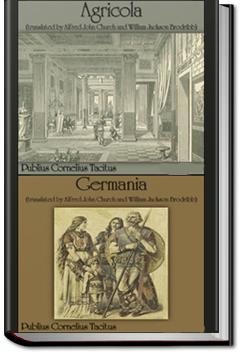UNLIMITED Audiobooks and eBooks
Over 40,000 books & works on all major devices
Get ALL YOU CAN for FREE for 30 days!
Germania and Agricola
Publius Cornelius Tacitus
Book Overview:
The Agricola is a book by the Roman historian Tacitus, which recounts the life of his father-in-law Gnaeus Julius Agricola, an eminent Roman general. It also covers, briefly, the geography and ethnography of ancient Britain. As in the Germania, Tacitus favorably contrasts the liberty of the native Britons to the corruption and tyranny of the Empire; the book also contains eloquent and vicious polemics against the rapacity and greed of Rome. This translation by Alfred John Church and William Jackson Brodribb, was first published in 1877.
The Germania, is an ethnographic work on the Germanic tribes outside the Roman Empire. Germania fits squarely within the tradition established by authors from Herodotus to Julius Caesar. Tacitus himself had already written a similar essay on the lands and tribes of Britannia in his Agricola. The Germania begins with a description of the lands, laws, and customs of the Germanic people; it then segues into descriptions of individual tribes, beginning with those dwelling closest to Roman lands and ending on the uttermost shores of the Baltic, among the amber-gathering Aesti, the primitive and savage Fenni, and the unknown tribes beyond them.
(Summary by Wikipedia)
The Agricola is a book by the Roman historian Tacitus, which recounts the life of his father-in-law Gnaeus Julius Agricola, an eminent Roman general. It also covers, briefly, the geography and ethnography of ancient Britain. As in the Germania, Tacitus favorably contrasts the liberty of the native Britons to the corruption and tyranny of the Empire; the book also contains eloquent and vicious polemics against the rapacity and greed of Rome. This translation by Alfred John Church and William Jackson Brodribb, was first published in 1877.
The Germania, is an ethnographic work on the Germanic tribes outside the Roman Empire. Germania fits squarely within the tradition established by authors from Herodotus to Julius Caesar. Tacitus himself had already written a similar essay on the lands and tribes of Britannia in his Agricola. The Germania begins with a description of the lands, laws, and customs of the Germanic people; it then segues into descriptions of individual tribes, beginning with those dwelling closest to Roman lands and ending on the uttermost shores of the Baltic, among the amber-gathering Aesti, the primitive and savage Fenni, and the unknown tribes beyond them.
(Summary by Wikipedia)
How does All You Can Books work?
All You Can Books gives you UNLIMITED access to over 40,000 Audiobooks, eBooks, and Foreign Language courses. Download as many audiobooks, ebooks, language audio courses, and language e-workbooks as you want during the FREE trial and it's all yours to keep even if you cancel during the FREE trial. The service works on any major device including computers, smartphones, music players, e-readers, and tablets. You can try the service for FREE for 30 days then it's just $19.99 per month after that. So for the price everyone else charges for just 1 book, we offer you UNLIMITED audio books, e-books and language courses to download and enjoy as you please. No restrictions.
Try now for FREE!

"Love your service - thanks so much for what you do!"
- Customer Cathryn Mazer
"I did not realize that you would have so many audio books I would enjoy"
- Customer Sharon Morrison
"For all my fellow Audio Book & E-Book regulars:
This is about as close to nirvana as I have found!"
- Twitter post from @bobbyekat



Community Reviews
Tacitus is most famous for his Histories and Annals, but three of his shorter works also survive. The Agricola and Germania are his first books, published in AD 98.
Agricola
The Agricola is a short biography of Tacitus’ father-in-law. Gnaeus Julius Agricola served as governor of Britain from 77-85 an
I’ve been on a Celtic bent lately, as one of the family is taking Celtic Studies at Uni and I have a few books to pass on. I can’t remember when, or why, the Tacitus took up residence on my shelves, but I thought I’d at least glance through it before it found a new home. Somewhere I’d gathered the i
They ravage, they slaughter, they seize by false pretenses, and all of this they hail as the construction of empire. And when in their wake nothing remains but a desert, they call that peace.
Tacitus as Graham Greene. Whether offering a biography or an anthropological survey, Tacitus remains both ter
For fans of the great Roman historian Tacitus who gave us "The Histories" and "The Annals," his two short works, "Agricola" and "Germania" will give you a mild fix.
"Agricola" is a short biography of Tacitus' father-in-law, Julius Agricola, who was governor of Britannia. This is the beginning of Taci
I don't read a lot of classics anymore (probably from having to binge on them in grad school) but these short works were both engaging and enjoyable. Like a lot of ancient writers, Tacitus is something of a jack of all trades.
He doesn't simply write history, or political commentary or cultural/anth